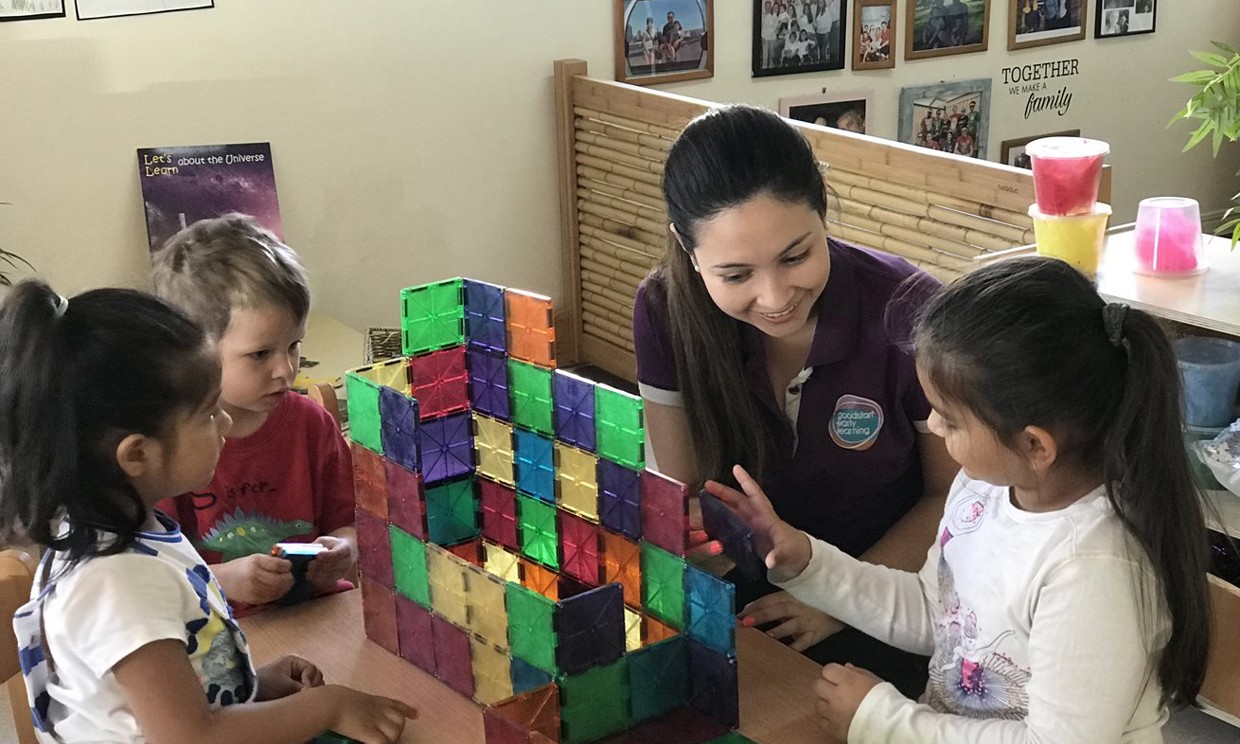Partnering with families to ensure children reach their full potential is the aim of Goodstart Early Learning’s key educator relationships.
The key educator relationship allows centres to ensure there is consistency and continuity through nurturing relationships between educators and children individually and in small groups. And for families, this means they always have a person to go to in the centre to talk about any issues or concerns they may have.
At Goodstart Morningside Wynnum Road, early childhood teacher Maria Leudo said key educator relationships meant she could watch the children and their families, as well as the educators open up and become more connected to each other.
“Working with children is my motivation and my passion, but to be able to work with children you need to create a relationship with them that is based on trust,” Ms Leudo said.
“They need to be comfortable with you. If they feel welcomed and cared for, it frees them up to explore their interests and get on with making the most of all the learning opportunities they encounter.”
Creating an environment that feels like home, was important to Ms Leudo, and all the educators at her centre because of the way it helped the children and their families feel comfortable and more likely to open up.
The principles of key educator relationships work towards creating a strong relationship with each family by developing a deep knowledge and understanding about each individual child’s rituals in the home and family context. It builds these shared understandings into daily practices and meaningful learning experiences.
“It is very important to us that we have open communication with our families and create a sense of belonging. By doing this we have found our families are so much happier to communicate with us about their children and their family values, traditions and family moments,” she said.
When the children feel secure, welcomed and loved, they were more likely to share things about themselves that helped educators tailor their programs to their interests and needs, Ms Leudo said.
“I love working with our families to develop the skills and the education of the children - it is such a fun and magical time that we get to be involved in.
“I truly believe that the kindergarten and leading up to kindergarten age is one of the most important stages of a child’s life, it is when they begin to develop the values and beliefs that can last their entire life, so it is very important that they form strong and secure bonds with their educators.”
Goodstart key educator national lead Michelle Richardson said key educator relationships could also work towards combatting significant stress for children in group care environments.
“Doing this then enables responsiveness to children’s social and emotional being, healthy brain development and enriched learning outcomes,” she said.
The key educator relationship allows centres to ensure there is consistency and continuity through nurturing relationships between educators and children individually and in small groups. And for families, this means they always have a person to go to in the centre to talk about any issues or concerns they may have.
At Goodstart Morningside Wynnum Road, early childhood teacher Maria Leudo said key educator relationships meant she could watch the children and their families, as well as the educators open up and become more connected to each other.
“Working with children is my motivation and my passion, but to be able to work with children you need to create a relationship with them that is based on trust,” Ms Leudo said.
“They need to be comfortable with you. If they feel welcomed and cared for, it frees them up to explore their interests and get on with making the most of all the learning opportunities they encounter.”
Creating an environment that feels like home, was important to Ms Leudo, and all the educators at her centre because of the way it helped the children and their families feel comfortable and more likely to open up.
The principles of key educator relationships work towards creating a strong relationship with each family by developing a deep knowledge and understanding about each individual child’s rituals in the home and family context. It builds these shared understandings into daily practices and meaningful learning experiences.
“It is very important to us that we have open communication with our families and create a sense of belonging. By doing this we have found our families are so much happier to communicate with us about their children and their family values, traditions and family moments,” she said.
When the children feel secure, welcomed and loved, they were more likely to share things about themselves that helped educators tailor their programs to their interests and needs, Ms Leudo said.
“I love working with our families to develop the skills and the education of the children - it is such a fun and magical time that we get to be involved in.
“I truly believe that the kindergarten and leading up to kindergarten age is one of the most important stages of a child’s life, it is when they begin to develop the values and beliefs that can last their entire life, so it is very important that they form strong and secure bonds with their educators.”
Goodstart key educator national lead Michelle Richardson said key educator relationships could also work towards combatting significant stress for children in group care environments.
“Doing this then enables responsiveness to children’s social and emotional being, healthy brain development and enriched learning outcomes,” she said.


